

12 habits of highly productive writers. Many writers I know love Joyce Carol Oates—some even refer to her as JCO, as if she were a brand as recognizable as CBS or BMW.

But just as often, the mention of her name is met by groans and complaints about how much she’s written. Her productivity seems like an affront. When someone’s doing a lot more than you, you notice it. It brings out your petty jealousy. And if you’re like me (occasionally petty and jealous), it might make you feel crappy about yourself. So I started to think about the practices of highly productive writers. 1. Some people are truly unable to tolerate that vilified protein, but many more leap after a culprit to explain their dyspepsia or inability to refrain from carby deliciosity. Productive writers don’t reach for excuses when the going gets hard. 2. Some writers like to talk about writing more than they actually like to write.
David Mitchell on How to Write: "Neglect Everything Else" By Heart is a series in which authors share and discuss their all-time favorite passages in literature.
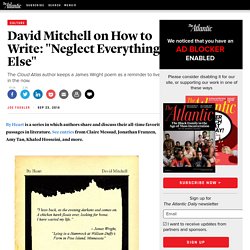
See entries from Claire Messud, Jonathan Franzen, Amy Tan, Khaled Hosseini, and more. When I asked David Mitchell, author of Cloud Atlas, to discuss a favorite passage for this series, I was initially surprised by his choice: a plain-stated, rustic poem by James Wright. “Lying in a Hammock at William Duffy’s Farm in Pine Island, Minnesota” bears no overt similarity to Mitchell’s maximalist, genre-busting epics. But, he explained, the poem’s pure sensory engagement inspires him to strive to be more present, attentive, and alert—an ongoing struggle with implications for his work habits, his craft, and the art of writing about the future.
One of the pleasures of reading David Mitchell is his mastery of extended dramatic monologues—the varied speakers of Cloud Atlas, for instance, whose dialects reflect their times. Maureen Johnson Books. I got a question the other day that needs an answer.
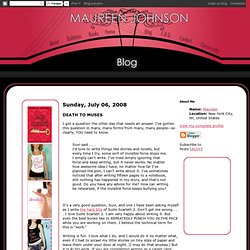
I’ve gotten this question in many, many forms from many, many people—so clearly, YOU need to know. Suvi said . . .I'd love to write things like stories and novels, but every time I try, some sort of invisible force stops me. JWAM reader request no. 2: Generating ideas. Travis Says: Where do your ideas come from?
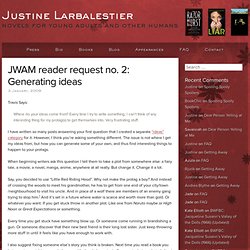
Every time I try to write something, I can’t think of any interesting thing for my protag(s) to get themselves into. Very frustrating stuff. I have written so many posts answering your first question that I created a separate “ideas” category for it. JWAM reader request no. 3: How to get unstuck. There are a number of requests that touch on the same theme of getting stuck: Jonathan says: I’d be very interested in the pushing a dead plot post, since that’s where my novel is at.On the other hand, I sort of know the answer already—stop reading blogs, sit down, and write.
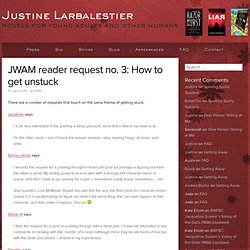
Sylvia_rachel says: I second the request for a pushing-through-a-dead-plot post (or perhaps a figuring-out-who-the-villain-is post). My writing projects tend to start with a strongly felt character/voice or scene, and then I have to go looking for a plot — sometimes easily found, sometimes … not.Quiz question: Lois McMaster Bujold has said that the way she finds plots for character-driven novels is (I’m paraphrasing) to figure out what’s the worst thing she can have happen to that character, and then make it happen. Luc Reid - Why Don't I Have a Plot, and Where Do I Get One? We don't necessarily need to include plots in our stories.

Some literary fiction has no plot and does fine, for instance. Vignettes don't have plots. Stories can be a tour of a fascinating place, or can delve deeply into character without really following a plot. Of course, if we're writing mainstream or genre fiction instead of literary fiction, we may find that no one will buy--and few people will read--a story that doesn't have a plot. Writing Excuses Episode 16: Butt In Chair, Hands On Keyboard. Howard kicks this off with his own sure-fire cure for Writers’ Block, “BIC HOK:” Butt In Chair, Hands On Keyboard.
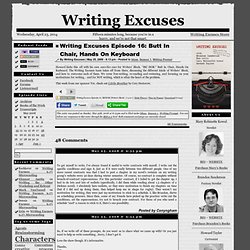
The Writing Excuses team takes off from there, discussing the different kinds of Writers’ Block, and how to overcome each of them. We cover free-writing, re-reading and reviewing, and focusing on your motivations for writing… and for NOT writing, which is often the heart of the problem. This week from our sponsor Tor, check out Little Brother by Cory Doctorow. This entry was posted on Sunday, May 25th, 2008 at 8:13 pm and is filed under Ideas, Season 1, Writing Prompt. You can follow any responses to this entry through the RSS 2.0 feed. Elizabeth Gilbert sobre darle alas a la creatividad. Cassandraclare: On inspiration. I get a lot of questions about writing and questions about inspiration make up the bulk of them.
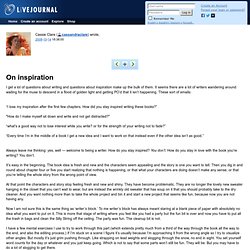
It seems there are a lot of writers wandering around waiting for the muse to descend in a flood of golden light and getting PO’d that it isn’t happening. These sort of emails: “I lose my inspiration after the first few chapters. How did you stay inspired writing these books?” "How do I make myself sit down and write and not get distracted? " “what's a good way not to lose interest while you write? “Every time I’m in the middle of a book I get a new idea and I want to work on that instead even if the other idea isn’t as good.” Always leave me thinking: yes, well — welcome to being a writer. It’s easy in the beginning. At that point the characters and story stop feeling fresh and new and shiny. Now I am not sure this is the same thing as ‘writer’s block.’ So how do you force yourself to do it? Which is where I think the whole narrative of inspiration comes in, and is ultimately unhelpful.